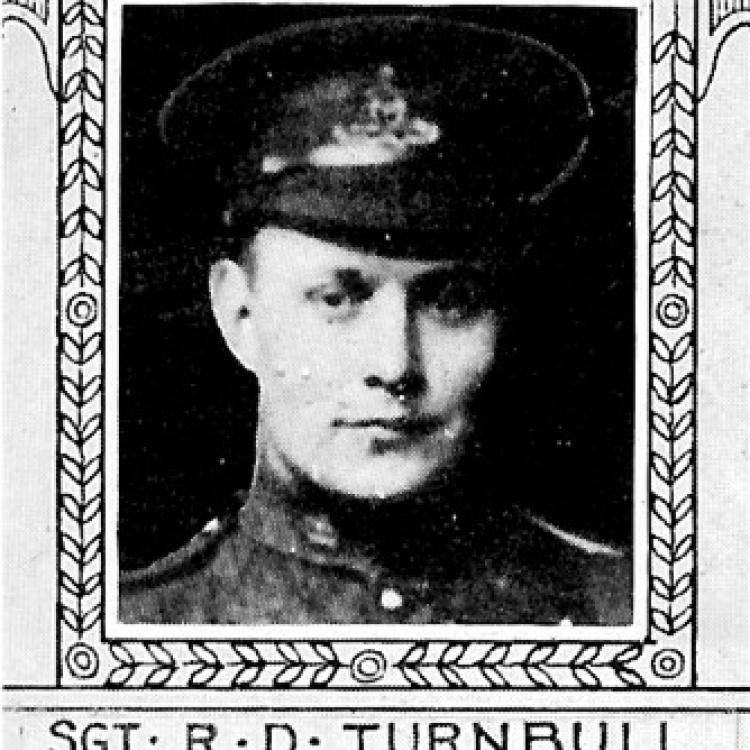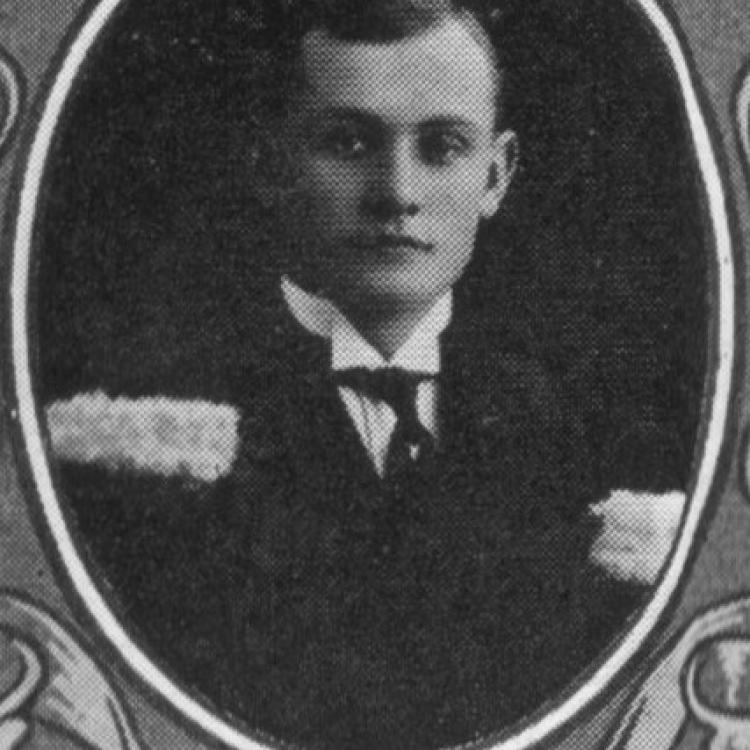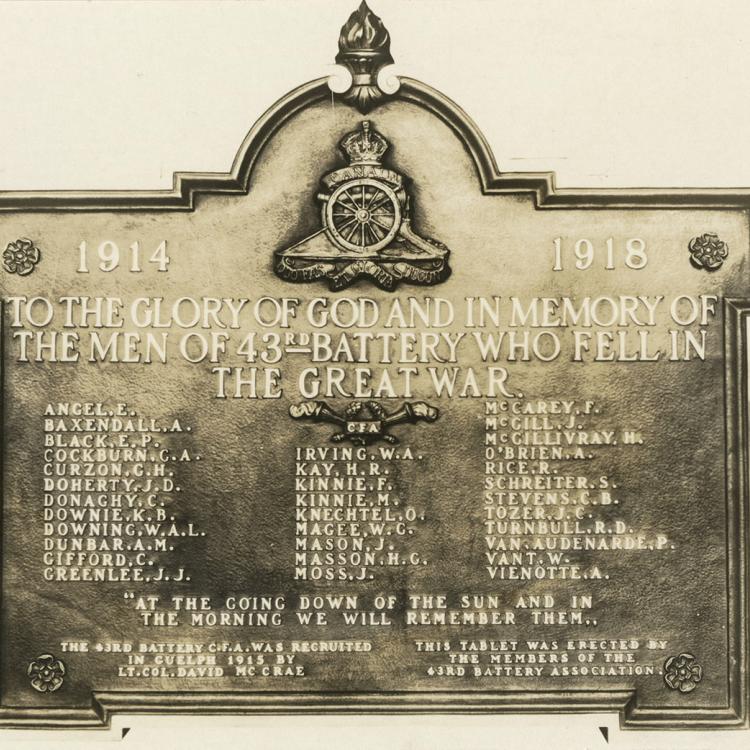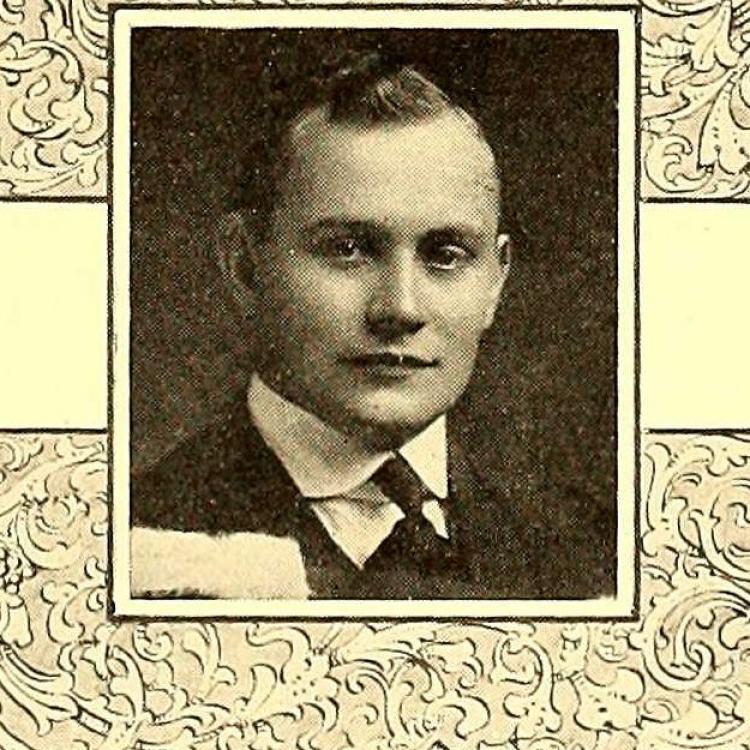TURNBULL, Reginald David
Next of Kin: Mrs. Maude Turnbull, wife, Dundas, Ontario
Occupation: Theological Student
Personal Details: 5 ft. 6 in., fair complexion, blue eyes, medium hair, Presbyterian
Born on January 23, 1890 near the hamlet of Farquhar, Ontario, Reginald David Turnbull was the first child and only son of William and Mary Turnbull. ‘Reg’ was educated at Usborne Township Public School and St. Mary’s Collegiate Institute, and in 1909 began studies at the University of Toronto, graduating with first-class honours. A notation in the 1913 Torontonensis yearbook records, “…besides taking active part in Y.M.C.A. work ‘Turnie’ is brilliant in conversation, broad in views, and believes in ‘giving the devil his due’.” The following year he began theological studies at Knox College, where he headed the first and second dean’s list. Although he missed his final examinations due to enlisting, his fellow students, by unanimous petition, obtained for him the award of the post-graduate fellowship, worth $400.00. Prior to enlisting, Reg was preparing for the ministry and was in charge of Crowland and Port Robinson Churches, near Welland, Ontario.
On January 31, 1916 Reg enlisted with the 43rd Battery, Canadian Field Artillery, Howitzer Brigade, at Guelph. Two weeks earlier he married Miss Melissa Maude Ralph in Dundas. After completing his training Reg left with his unit aboard the S.S. Missanabie, and arrived in Plymouth, England on March 13, 1916. In May, he was appointed to the rank of Provisional Bombardier while at Witley Camp, and was later transferred to the 10th Brigade, Canadian Field Artillery. During his time in England, Reg wrote several letters to his friends and relatives back home, many of which were published in the local Exeter newspapers. In June, Reg’s rank of Bombardier was confirmed, and on July 13, 1916 he embarked at Portsmouth enroute to Havre, France.
Once in France, Reg saw action in the area of Ypres and the Somme, and in March 1917, he was appointed Acting Sergeant. In early April, the Canadian Field Artillery, along with thousands of other Canadian troops, were preparing for the battle of Vimy Ridge. At 5:30 a.m. on Easter Monday, April 9, 1917, the advance went forward, and the artillery supported the troops with rolling barrages. The artillery had also done damage to the enemy trenches and wire systems protecting them. As the day progressed batteries were able to establish observation posts on the near side of the ridge. The infantry was able to consolidate a new forward line on the slopes of Vimy Ridge with the support of the artillery. In the afternoon the artillery began to move their positions to the east side of the Arras-Bethune Road to previously selected positions.
On the first day of the Battle of Vimy Ridge, Sergeant Turnbull had gone to the gun next to his to pass along information to them and had just returned to his own gun when he was instantly killed from the splinter of an enemy shell that had exploded in front of his gun.
On Sunday, June 3, 1917, a memorial service was held for Reginald Turnbull at the Thames Road Presbyterian Church. The service was conducted by Rev. Dr. Fletcher, and Dr. Gandier, principal of Knox College. In his comments, Dr. Gandier remarked, “The choicest were selected for the supreme sacrifice. Reg had no love of war; no hatred in his heart. He hated anything of militarism. The call to die for others was so loud he could not resist. He was a clean wholesome Canadian youth, boyish in manner, open hearted, enthusiastic.”
In the August 30th 1917 edition of The Exeter Advocate, Reg’s uncle and aunt, Reeve and Mrs. Beaver, shared a letter they received from Sgt. J.R. Mutchmor, close friend to Reg. “I was very pleased to learn in your letter about Rev. Gandier preaching a memorial sermon for Reg. All of us felt his loss very much. He was a good friend to everyone in the battery and his happy smile and willing hand helped to make many hard places easy. Since the first day we entered University in 1909 Reg and I have been close friends, so naturally his death came very hard to me. I have written to his wife and his parents and have told them of the manner in which he paid the supreme sacrifice. It seems too bad that one whose career was so full of promise should be called away at such an early age, but shells and bullets are no respecters of persons, and he who would serve his country must be prepared to meet his death. Reg was such a man. He enlisted to fight and he was killed in action. No one could have died happier. There was a smile on his face. We who trust in Jesus Christ know that death has no sting, because we have faith in the world that is to be. I am now in Reserve Battery after three months in hospital, and my leg is almost right again.”





